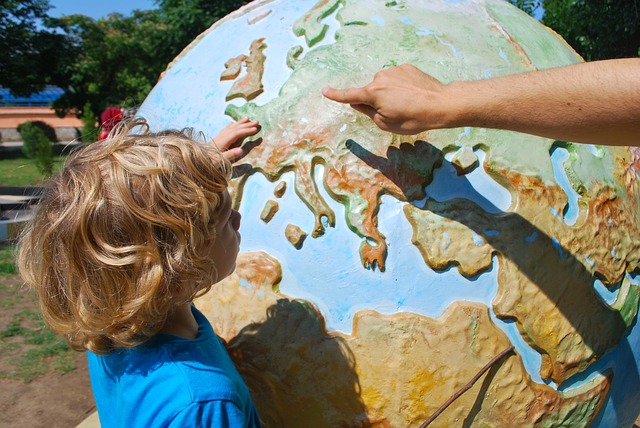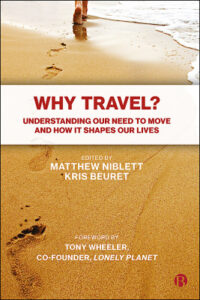Educational Travel Today: Study Abroad, Road Schooling and Self Improvement
“Travel is the best education”: so say a plethora of inspirational travel blogs and articles, encouraging the reader to see the world and learn new things. As we examined in our last blogpost, the idea of the educational value of travel is far from new, although according to some academics this link has been “long neglected by tourism researchers.” [1] In this second blogpost on the topic we will look at educational travel nowadays, from ‘road schooling’ to self improvement, to see what it is that we believe travel can teach us today.
In the 20th century it became common for schools, universities and other institutions to set up travel funds and study abroad programmes to encourage educational travel, traditions which remain strong today. [2] For example the EU ERASMUS scheme has enabled thousands of students to experience living and studying abroad; and high school language exchange programmes have been an important part of UK education since after the Second World War. For the last few decades, specialist travel agencies have begun to offer educational trips for schools and the ‘gap year’ has become a popular way for young people to gain experience and broaden their horizons beyond the classroom. A brief survey of the promotional material for these organizations and programmes highlights some of the educational benefits that such travel is believed to have. For example, The Winston Churchill Memorial Trust’s tagline is “Travel to learn – return to inspire…”; the charity Global Glimpse aims to “open the eyes of tomorrow’s leaders”; and the University of Liverpool study abroad programme speaks of creating “global citizens…[who can] succeed in the international and inter-cultural employment market.” [3] Specialist educational travel company ACIS, which organizes school trips, claims that travel aids with learning languages, art and history as well as building confidence and independence and “perhaps most important of all, students gain new insights into their own culture, and a more global perspective—so important in today’s interconnected world.” [4]
Not satisfied with the occasional school trip or summer holiday, some families are now opting for ‘road schooling’ or ‘world schooling’—removing their children from conventional school to embark on long-term family travels, learning ‘on the road’. The experiences of many of these families have been the subject of numerous newspaper articles and popular blogs in which the parents are enthusiastic about the educational benefits of travel. [5] The Hurst family, who travelled across 13 countries with their sons, call it ‘education by astonishment’ [6] and many others point out how every activity can be turned into an educational opportunity whether it be learning about the natural environment, languages, art, history or even maths. These parents, many of them qualified teachers, feel that travel offers a deeper, experiential education which focuses on skills and personal growth as well as knowledge; and also a broader education, not constrained by the often Eurocentric curriculum. [7]
Education is a major motivating factor behind leisure travel for many adults nowadays too. Holidays that involve formal learning, such as language or cookery courses, are gaining popularity; and many tourists will undertake informal learning too, such as visiting museums and cultural sites and researching the history and local customs of their destinations. Many commentators espouse the educational benefits of travel and list quotes (often of dubious provenance) [8] making claims along the lines that ‘there is no greater education than travel.’ As with educational travel for children and young people, the benefits of travel are described as being both in terms of knowledge acquisition (languages, history, culture) and personal development (social skills, independence, adaptability). Part of this includes an emphasis on ‘self-knowledge,’ and on understanding both the differences between cultures and the commonalities that connect us. We could say that in today’s world, compared to centuries past, the educational benefits of travel are couched more in terms of personal growth and the interconnectedness of a global society.
As was seen in the last blogpost, which examined educational travel over the last 500 years, it is clear that education, the acquisition of new knowledge and skills, has long been a key motivator of travel – even if the emphasis on who should travel and what they should learn may have changed over the years. The Independent Transport Commission believes that understanding the motivations behind why people travel, including for educational purposes, is of huge importance in making better decisions about travel. To this end, the ITC has commissioned the Why Travel? Project, which aims to understand better our motivations for travel from a broad range of perspectives and to help us to make better decisions in future regarding human travel and transport. For more information on the project, including news and expert views, see www.whytravel.org
See also:
Travel as Education in 16th-19th century Europe blogpost
Tourism topic page
Notes:
[1] https://www.sciencedirect.com/science/article/pii/S0160738311001824
[2] Study abroad programmes are now an integral part of many undergraduate degrees. This article discusses their rise to popularity in the US in the 1920s: https://pilotscholars.up.edu/cgi/viewcontent.cgi?article=1039&context=edu_facpubs
There is evidence that in the US study abroad programmes are more popular with female than male students. Reasons for this are unclear but it is interesting to note this changing gender dynamic of educational travel, given that a few centuries ago nearly all ‘educational travel’ was undertaken by men. This is discussed further here: https://www.washingtonpost.com/news/answer-sheet/wp/2015/10/09/why-do-more-u-s-women-study-abroad-than-men/?utm_term=.6f051ef1595a
[3] https://www.wcmt.org.uk/ and https://globalglimpse.org/ and https://www.liverpool.ac.uk/study/undergraduate/goabroad/
[4] https://www.acis.com/about/educational-travel
[5] For example, the Kellogg family, a family of 14 travelling across the US and road schooling on the way, have thousands of instagram and facebook followers and their own reality TV show.
[6] https://www.theguardian.com/travel/2016/jan/29/is-world-schooling-kids-selfish-family-travel-edventures
[7] https://www.theatlantic.com/education/archive/2014/12/traveling-offers-lessons-that-us-schools-fail-to-provide/383090/
[8] Quotes often attributed to Mohammad and St Augustine about travel and education may more safely be attributed to ‘Anonymous’ according to this blog: http://manonthelam.com/7-inspiring-but-completely-fake-famous-travel-quotes-plus-2-that-were-almost-never-famous-at-all/



